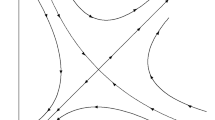Summary.
We study the implications of random discount rates of future generations for saving behavior and capital holdings in a steady state competitive equilibrium with heterogeneous population. A well-known difficulty in deterministic economies with heterogeneous households is that in steady state only the most patient households hold capital. In this paper we state conditions under which this random discounting is sufficient for households other than the most patient ones to save. We thus provide a simple and natural way of overcoming the aforementioned difficulty.
Similar content being viewed by others
Author information
Authors and Affiliations
Additional information
Received: December 28, 1998; revised version: May 19, 1999
Rights and permissions
About this article
Cite this article
Karni, E., Zilcha, I. Saving behavior in stationary equilibrium with random discounting. Econ Theory 15, 551–564 (2000). https://doi.org/10.1007/s001990050311
Issue Date:
DOI: https://doi.org/10.1007/s001990050311




